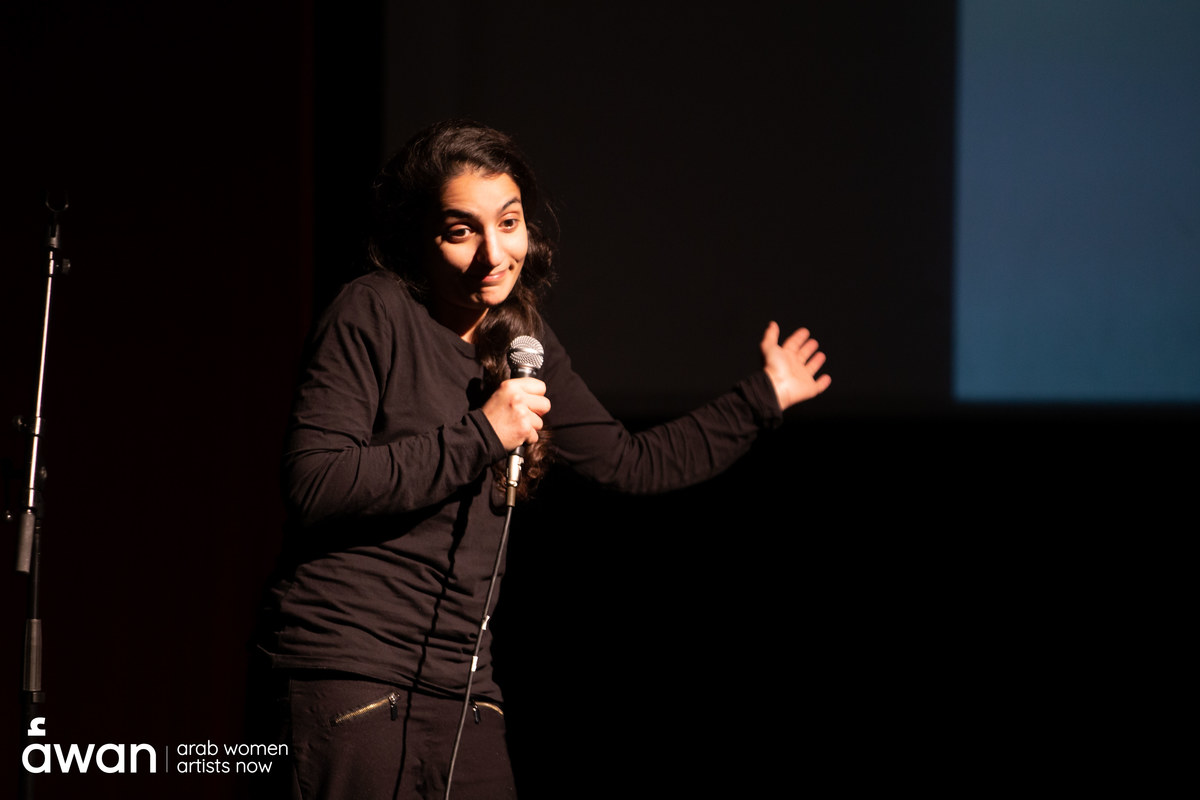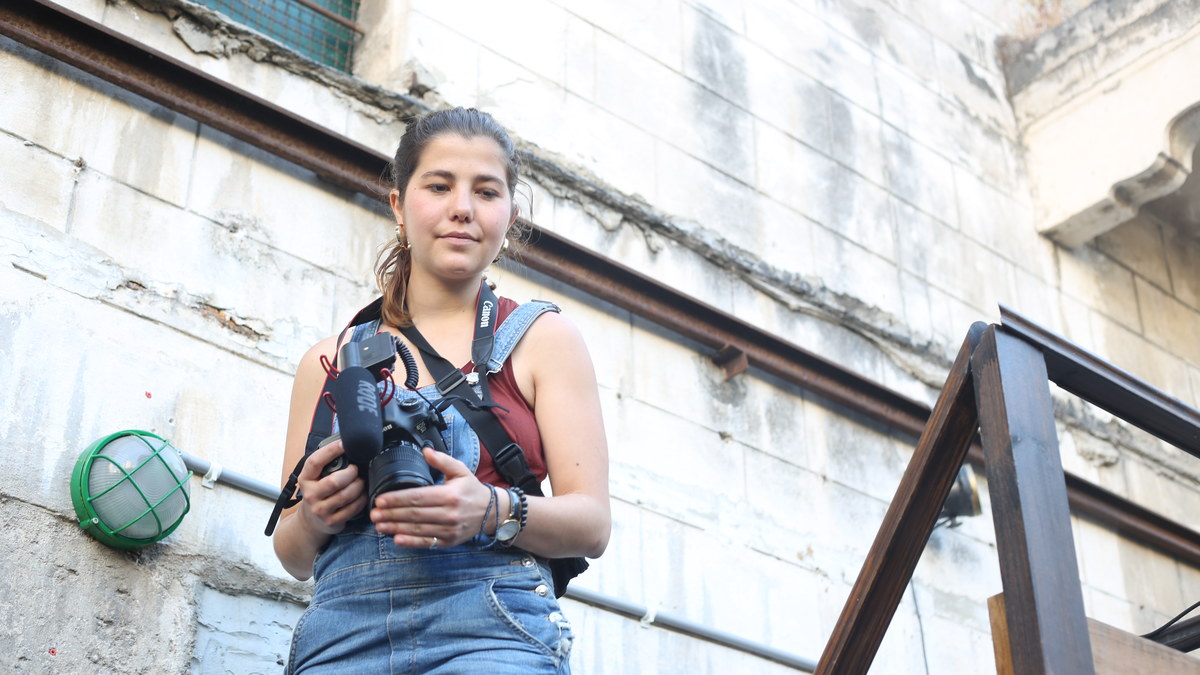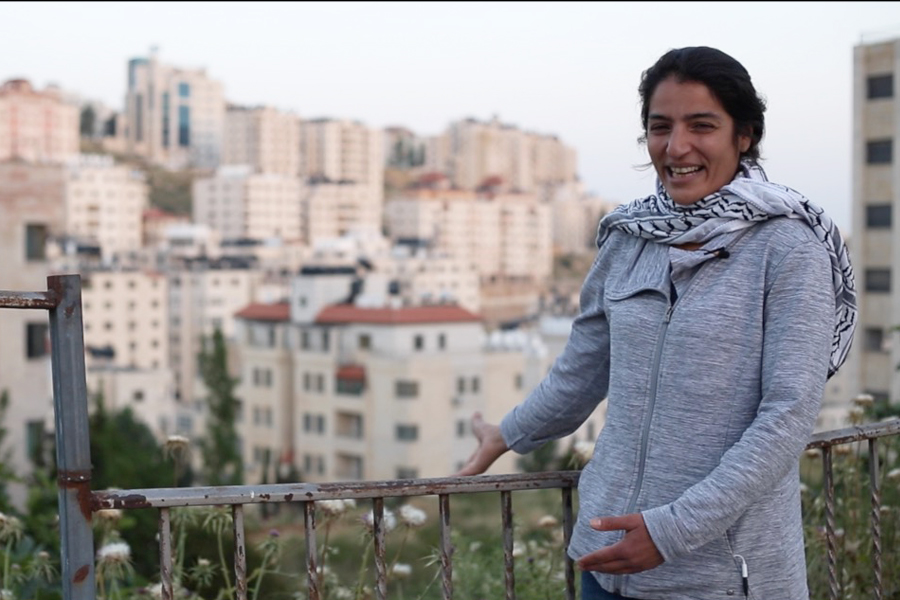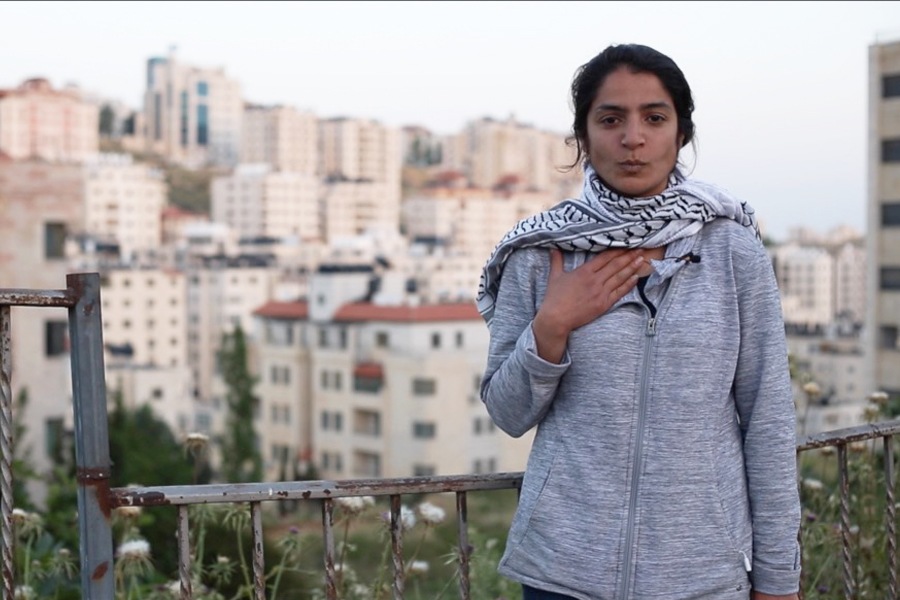LONDON: Nour Alkawaja’s film “Misunderstanding of Palestine” is still a work in progress. But if the raw version she showed at the Arab Women Artists Now festival in London is anything to go by, it’s going to make a big impact.
The movie is a ‘mockumentary’ filmed on the West Bank with a curious mix of real and imaginary characters. Alkawaja admits that a lack of money has limited her access to actors, so she has had to resort to playing the key role herself — a tour guide from a company called ‘Occupied Nation Tourism.’
“I didn’t want to be the ‘face’ of the film,” she says. “It’s just that I didn’t have the money to pay for another actor!” Fortunately, she has a wealth of comedy experience, being a professional clown teacher and actress.

Alkawaja admits that a lack of money has limited her access to actors. (Supplied)
Her character is filmed as she presents various faces of Palestine for a promotional travel video and it’s hilarious. She comes across as an eager but obvious amateur, covering her inexperience with a tendency to blame everyone else. She repeatedly admonishes the crew to shout “Action” to warn her that filming is beginning and stomps off when she loses her temper — whether that’s in the middle of describing a particular feature or mid-interview.
The shortage of funds has meant even her director of photography has been roped in to play a visiting French tourist who is presented as a sort of unwitting trophy to prove that Palestine is still a draw.
But threaded throughout the film — in stark contrast to the comedy — runs a dark vein of sadness. Characters suddenly let down their masks and confide what they really feel; the sense of hopelessness and desperation that comes from living such circumscribed lives.

The shortage of funds has meant even her director of photography has been roped in to play a visiting French tourist. (Supplied)
For example, a comedic character called Hamza, who first appears making repeated —unsuccessful — attempts to introduce himself as a representative of ‘Occupied Nation Tourism’ in English, is later shown breaking down as he talks about his life on the West Bank.
“He was talking about Gaza and the West Bank — the feeling of being trapped and the lack of opportunity,” Alkawaja explains. “That really happened during filming. It was not acting or scripted.”
Hamza is a dancer whom Alkawaja met when she went to film his dance troupe.
“As a clown teacher, you sniff out clowns — and as a comedy teacher you sniff out comedians. I could just see that he had talent,” she says.
Alkawaja may be a clown herself, but not in the red-nose, circus-performer sense that most readily come to mind. She comes from a much older tradition where the clown, fool or jester had a much more complex place in society. Their role was far broader than simply providing entertainment.

Hamza is a dancer whom Alkawaja met when she went to film his dance troupe. (Supplied)
In Shakespeare’s “King Lear,” for example, the fool is a trusted member of the monarch’s inner circle who uses humor and irony to point out his master’s failings. Often, professional fools were able to act as go-betweens between a ruler and his ministers as they were able to confront their masters (or mistresses) without risk of punishment, acting as a moderating influence.
“The clown or the fool is the person who is gifted — or is stupid or crazy — enough to advertise their own flaws and the flaws of humanity,” Alkawaja says. “I teach clowning in universities, schools and art centers and I always say to my students that being a clown is hard.
“It’s been hard for clowns because the whole point of being a clown is that you have this unconditional faith that mankind can be better and that somehow we are all one. In today’s society it’s not easy to hold onto to that belief,” she continues.
“My work is through theatre, film and writing. When I was younger I used to perform in other people’s work, but today I am an old, broken clown and it’s my turn to advise others what to do. Now it’s the turn of others to be in my work.”

Alkawaja has a wealth of comedy experience, being a professional clown teacher and actress. (Supplied)
The film, which she is struggling to finance, is a passion project for Alkawaja. She is particularly driven by the inspiring example set by her father who grew up in a small village in the mountains of the West Bank.
“My dad was one of 11 children. The family had nothing. They had to work very hard. After school, my dad would work threshing wheat. He put himself through high school and went to Egypt to study. He didn’t have it easy because his dad died when he was seven,” Alkawaja says.
Her mother comes from Jenin and her parents met in Egypt. Her father trained as a doctor and, after struggling to find work in Palestine, moved to Saudi Arabia.
“When he returned home he couldn’t find work and Saudi proved his refuge,” Alkawaja says. She was born in the Kingdom and was called Nour rather than her intended name —Maryam — at the insistence of the nurses, because she arrived at dawn. She stands out in her family as her five siblings all have names beginning with ‘M’.
The family left Saudi Arabia when Alkawaja was still a baby and she grew up in several different countries, including Jordan, Palestine and Canada. She has also travelled extensively for her work including spells in France, Russia and the UK — where she now lives.
It is clear that talking about her family — and especially her father, who now lives in Canada — is difficult for Alkawaja.

Alkawaja’s film is a powerful warning about the impact of suffering and deprivation on humanity, despite its comedic overtones. (Supplied)
“I would say that I get emotional because my dad never was,” she says. “He taught us to be steadfast and strong, and really everything I am doing is for him. I am so privileged in every possible way. I went to the best schools. I wouldn’t be where I am today if it wasn’t for my family.”
Her film, then, is something of a tribute to her father and his lost homeland.
Alkawaja attempts to vocalize the message behind her movie. “We are all one and not many — there is always room for people,” she says. “I am trying to advocate equality. I am not anti-Israel; I am not anti-Jew; I am not anti-anyone. We are all equal. Most Palestinians take the same view. We are a peaceful people.”
Keeping control over that message — and the film in general — is very important to Alkawaja. She is determined not to compromise despite financial pressures.
“At the end of the day, even though it is a ‘mockumentary’ it is also reality. I do not want my message to be manipulated,” she explains. “I want to keep control of the project — not because I want power but because I want the people in the movie to be protected.”
Ultimately, her film is a powerful warning about the impact of suffering and deprivation on humanity, despite its comedic overtones.
“When the clown can no-longer laugh and breaks down in tears then we have, as humanity, reached a place of hopelessness,” she says. “Because the clown would have faith when no one else did.”





















